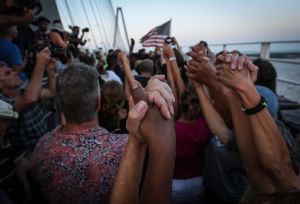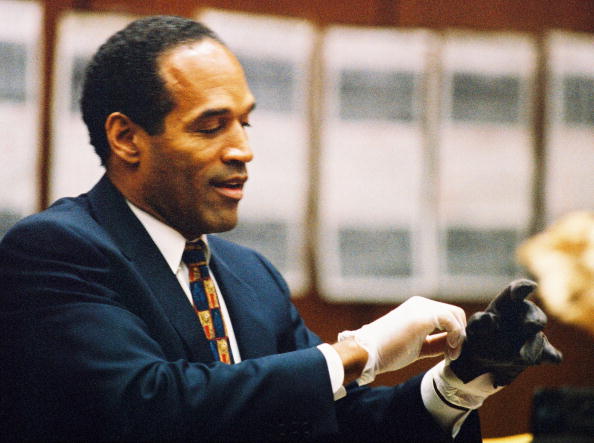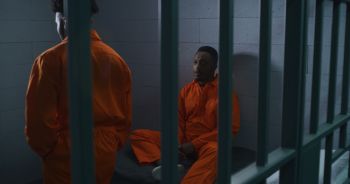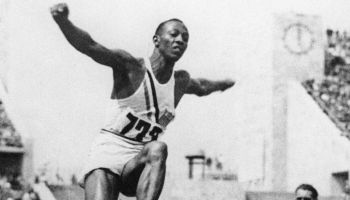
Source: (Photo by Cem Ozdel/Anadolu Agency/Getty Images)
There’s an old adage: “take two steps forward, one step back.” At times in the Black community, it seems like we take one step forward and two steps back.
No matter which version applies, the reality is, while we work toward progress, we are simultaneously seeing a regression in some aspects. This was no more evident last week when the first African-American woman was sworn in as Attorney General by the first Black President. It was a moment that was historic and odds-defying. Yet, that same night, a White supremacist terrorist sat in on a prayer meeting at the oldest AME church in the south and decided to open fire, killing 9 peaceful and innocent people. Among the dead, the church’s pastor, Rev. Clementa Pinckney, who was just 41-years-old, who also served in the state Senate since 2000, and was working with the family of Walter Scott.
In 1963, the 16th Street Baptist Church in Birmingham, Alabama was bombed by four White supremacist terrorists. That bombing killed four girls and injured 22 others. Dr. King was quoted as saying it was, “one of the most vicious and tragic crimes ever perpetrated against humanity.” Yet little more than 50 years later, we have a situation that could equally be described that way as we struggle to understand how someone could hate so much that he would kill people who welcomed him in. In 1963, Black voters throughout the south were trying to fight suppressive voter laws and practices that prevented them from registering to vote, much less casting a ballot. As displayed in the 2014 movie Selma, in 1965, marchers were beaten, bloodied and killed as they tried to fight for the right to vote. The marches led to the passage of the 1965 Voting Rights Act. Yet, 50 years later, we are faced with the reality that things appear different superficially, however, voters in many states are still fighting for access to the ballot box as registration days are shortened, voter IDs are required and early voting has been cut short or eliminated. In the midst of these attempts by states to limit voting opportunities, the Supreme Court of the United States removed one of the most powerful provisions that the civil rights community had in combating these efforts by declaring that the formula to determine what states were required to have preclearance to change their voter laws was outdated and therefore nullified.
Another scene in the movie Selma depicts Jimmie Lee Jackson being killed by police. The unarmed man had committed no real crime, but the officer who shot him served 6 months in prison after pleading guilty to manslaughter 45 years after the crime had been committed. Police brutality in the Black community is nothing new, and if anything, is a big part of the lack of trust in the police and the system in general. Fifty years after the killing of Jimmie Lee Jackson, police are still brutalizing and killing Black people at rates higher than others and many times walking away without serving any time in jail or in some cases, even having charges filed against them.
While we have made so much progress in the Black community, there are still efforts that threaten to undermine all that we have achieved. For some Blacks who may have attained levels of success and access that their parents or grandparents before them were unable to reach, there can be a feeling that some of what happens in the urban epicenters does not apply to them. They may erroneously assume that because they can become a top executive in companies where there has never before been a Black executive or that their children can go to whatever private school or elite college they want, that they are immune to the issues facing Black America.
What we have witnessed in recent weeks, both with the McKinney pool incident and now the AME church shooting, is that for those people who still want to embrace confederate ideologies, your Blackness alone is the issue. No amount of education, social grooming, or high-powered relationships will ever change the fact that at the end of the day, you are a Black person and you are not equal in their eyes. As we celebrate Juneteenth, the day that slaves in Texas learned of their freedom, two and a half years after the signing of the Emancipation Proclamation, it’s important to recognize that even the well-meaning Abraham Lincoln, who so many have revered as a champion of the Black people, never considered Blacks as his equals. Despite there being much progress achieved, there is a separate force that wants to pull us back. It has become more evident since the election of President Obama. Our duty is to ensure that no matter how arduous the process, that we never stop moving forward and making those steps toward progress.
Janaye Ingram is the National Executive Director of National Action Network (NAN) and oversees NAN’s action agenda and legislative advocacy work under Founder and President, Rev. Al Sharpton. In this role, Ingram focuses on issues such as education, criminal justice, housing, technology, economic development and healthcare, among others.

















